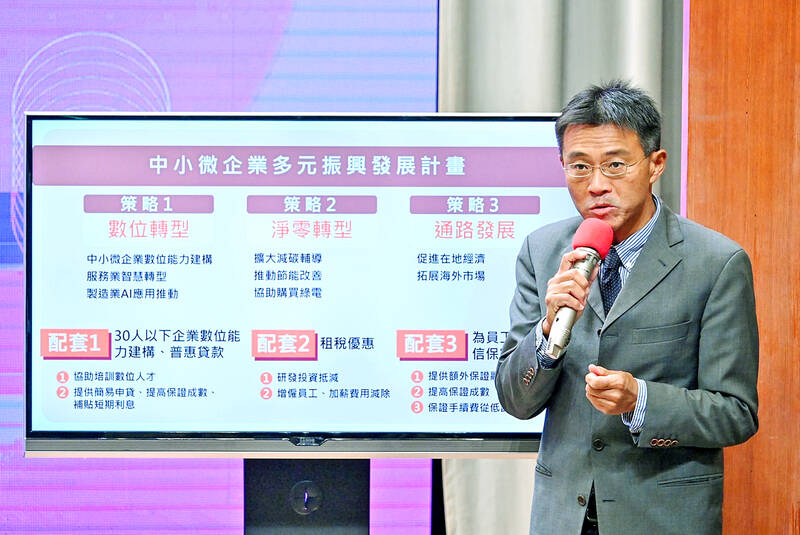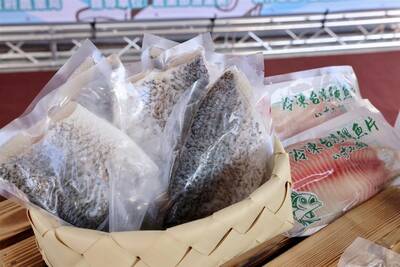The Executive Yuan yesterday approved a development plan for small and medium enterprises (SMEs), which includes preferential loans, tax incentives and digital transformation support.
The plan offers tax incentives for research and development, intellectual property rights, and employee expansion and salary raises, with the latter also opening the door to additional government subsidies.
Taiwan’s economic achievements and performance depend on its 1.63 million small businesses, which also contribute to the nation’s economic stability and well-being, Executive Yuan spokesperson Michelle Lee (李慧芝) quoted Premier Cho Jung-tai (卓榮泰) as saying during the Cabinet meeting.

Photo courtesy of the Executive Yuan
The plan is focused on helping SMEs expand their access to domestic and international markets, and support their transition to a digital economy and net zero emissions, Small and Medium Enterprise Startup Administration Director-General Lee Guann-jyh (李冠志) said.
The preferential loan program specifically targets SMEs with less than 30 employees, Lee said.
Taiwan has 1.43 million small businesses that have less than 30 employees, which account for 87 percent of all SMEs, Lee added.
The program offers subsidies of up to NT$100,000 (US$3,102) for SMEs that are undergoing digital transformation to help mitigate the impact of minimum wage increases and help cover the cost of training employees, he said.
If these businesses increase revenue and provide salary raises, they can receive additional subsidies, he added.
To encourage wage increases, the government is considering a fund that SMEs can access upon providing raises that could be worth NT$35 million at a low handling fee of 0.1 percent, Lee said.
The incentives are to be retroactive from Jan. 1 and continue until Dec. 31, 2033.
Additionally, the Ministry of Economic Affairs plans to incorporate tax incentives for industrial holding companies into amendments to the Statute for Industrial Innovation (產業創新條例), Deputy Minister of Economic Affairs Ho Chin-tsang (何晉滄) said.
These proposals were originally suggested by the National Development Council in hopes of supporting key manufacturing sectors, he added.

Taiwan's Vice President Hsiao Bi-khim (蕭美琴) said Saturday that she would not be intimidated by the Chinese Communist Party (CCP), following reports that Chinese agents planned to ram her car during a visit to the Czech Republic last year. "I had a great visit to Prague & thank the Czech authorities for their hospitality & ensuring my safety," Hsiao said on social media platform X. "The CCP's unlawful activities will NOT intimidate me from voicing Taiwan's interests in the international community," she wrote. Hsiao visited the Czech Republic on March 18 last year as vice president-elect and met with Czech Senate leadership, including

There have been clear signs of Chinese Communist Party (CCP) attempts to interfere in the nationwide recall vote on July 26 in support of Chinese Nationalist Party (KMT) legislators facing recall, an unnamed government official said, warning about possible further actions. The CCP is actively involved in Taiwanese politics, and interference in the recall vote is to be expected, with multiple Chinese state media and TAO attempts to discredit the Democratic Progressive Party (DPP) and undermine public support of their recall movement, the official said. This interference includes a smear campaign initiated this month by a pro-Beijing Hong Kong news outlet against

A week-long exhibition on modern Tibetan history and the Dalai Lama’s global advocacy opened yesterday in Taipei, featuring quotes and artworks highlighting human rights and China’s ongoing repression of Tibetans, Hong Kongers and Uighurs. The exhibition, the first organized by the Human Rights Network for Tibet and Taiwan (HRNTT), is titled “From the Snowy Ridges to the Ocean of Wisdom.” “It would be impossible for Tibetans inside Tibet to hold an exhibition like this — we can do it. because we live in a free and democratic country,” HRNTT secretary-general Tashi Tsering said. Tashi Tsering, a Taiwan-based Tibetan who has never

A first shipment of five tons of Taiwan tilapia was sent from Tainan to Singapore on Wednesday, following an order valued at NT$600,000 (US$20,500) placed with a company in the city. The products, including frozen whole fish and pre- cooked fish belly, were dispatched from Jiangjun Fishing Harbor, where a new aquatic processing and logistics center is under construction. At the launch, Tainan Mayor Huang Wei-che (黃偉哲) called the move a “breakthrough,” marking Taiwan’s expansion into the Singaporean tilapia market. Taiwan’s tilapia exports have traditionally focused on the United States, Canada, and the Middle East, Huang said, adding that the new foothold in